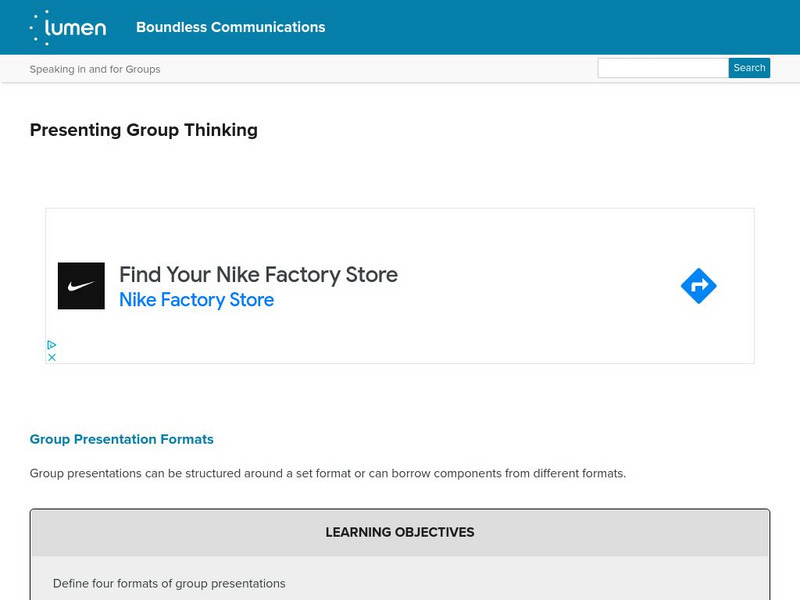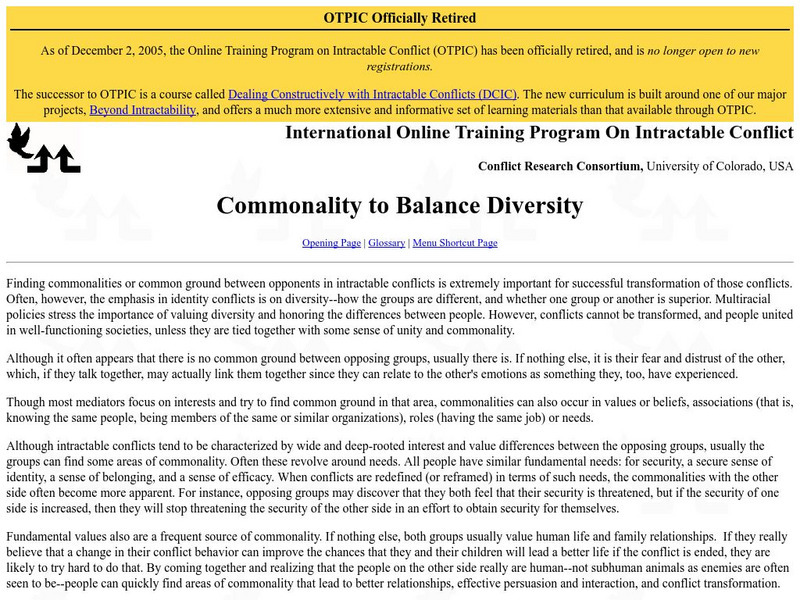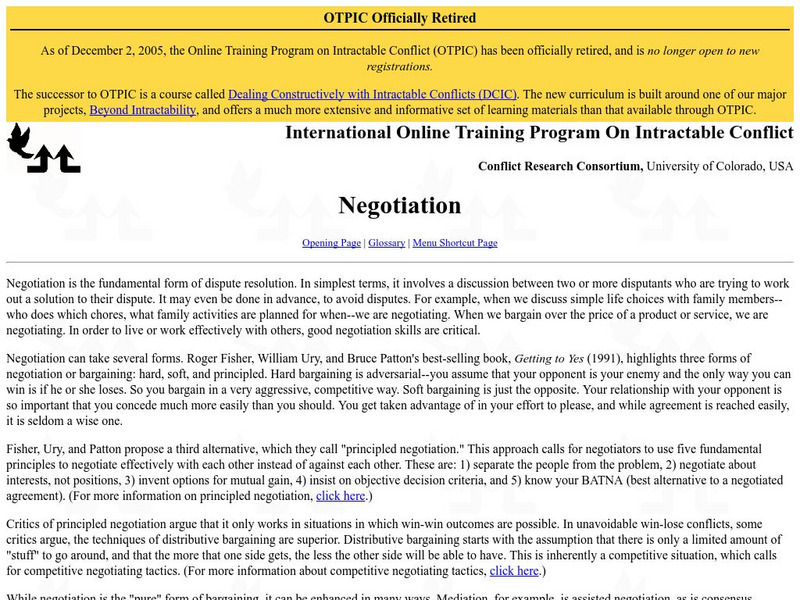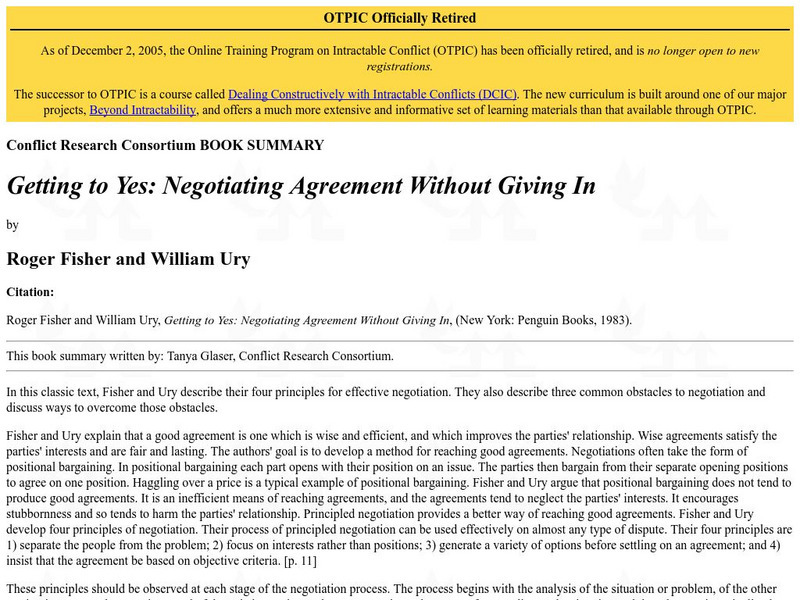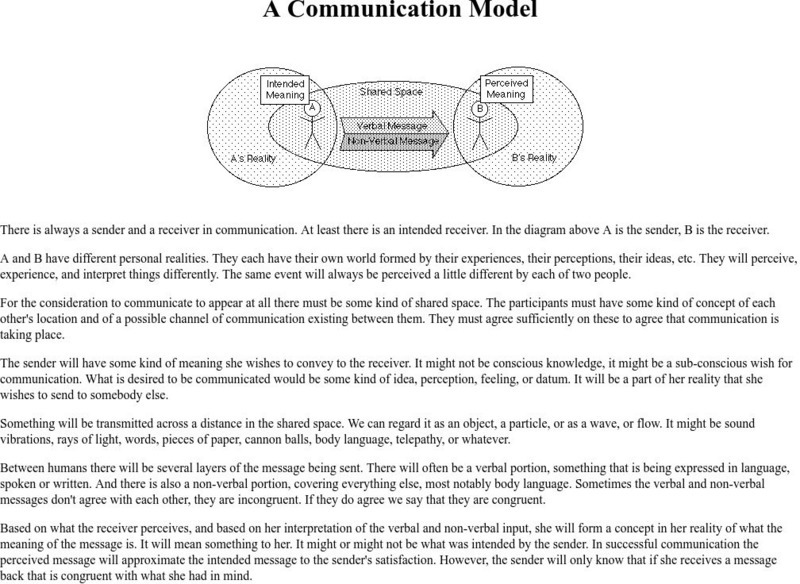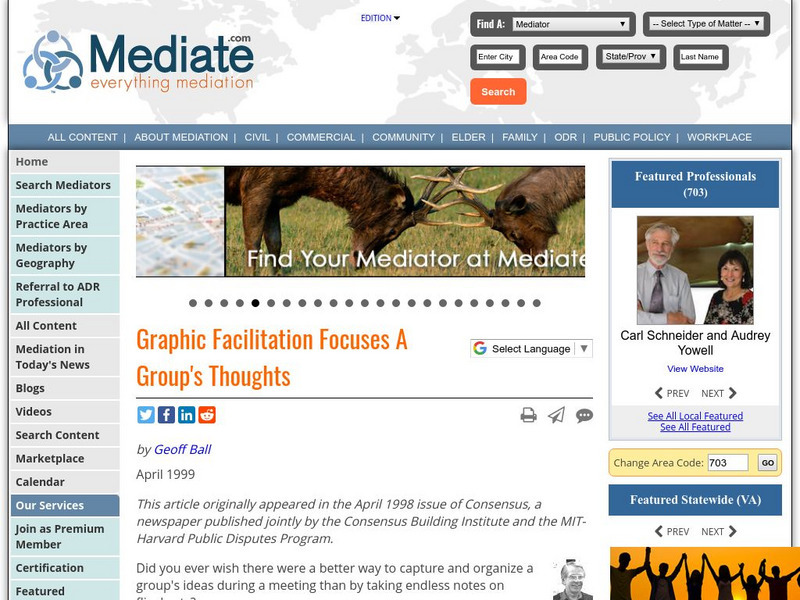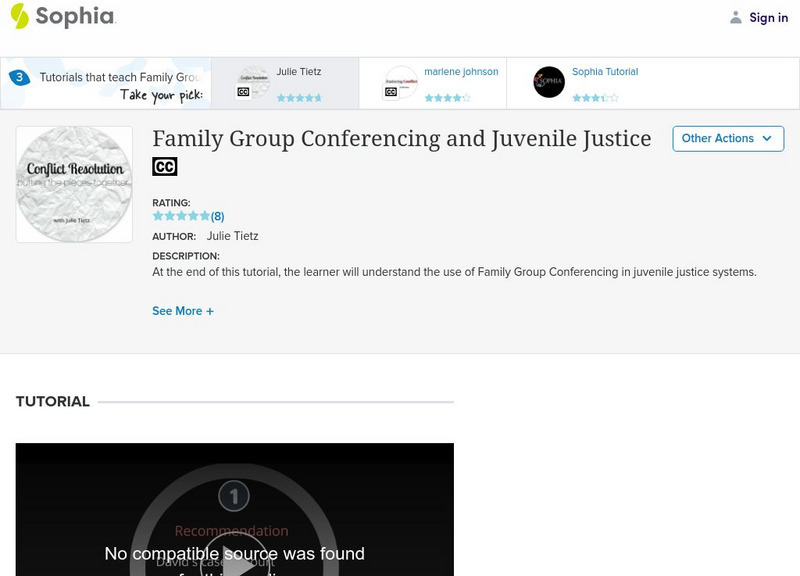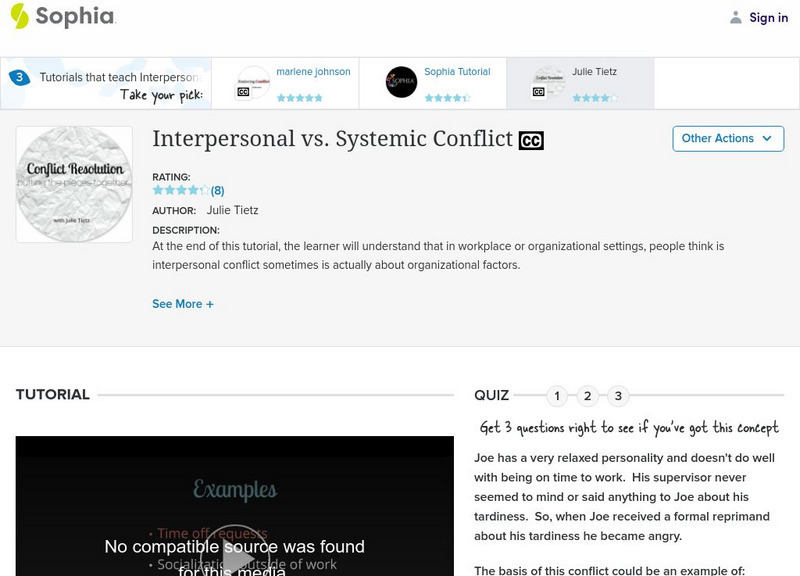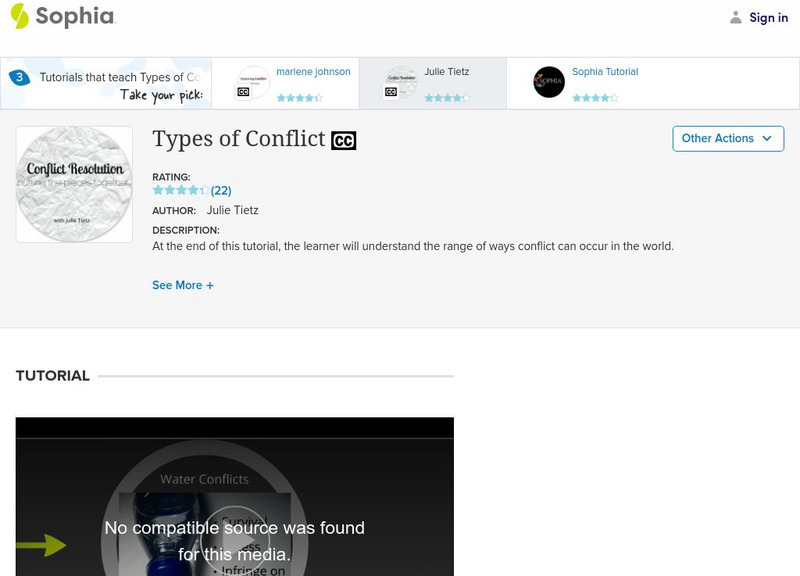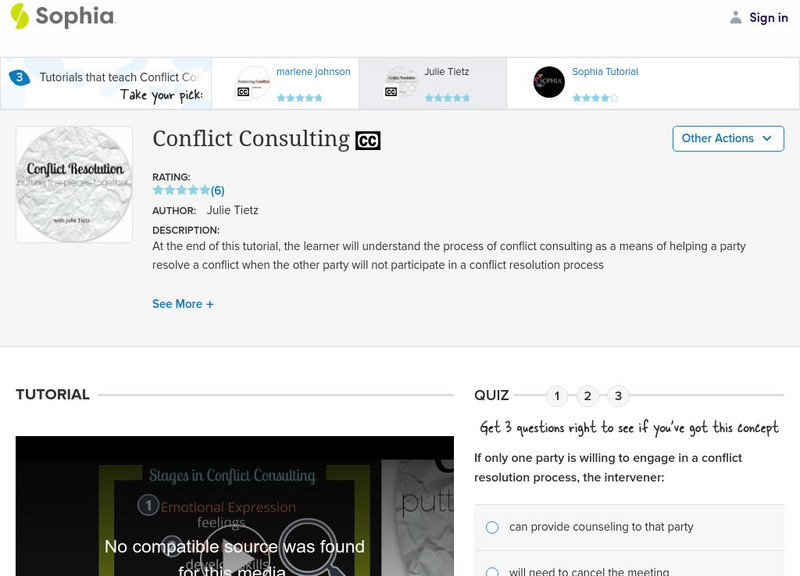Lumen Learning
Lumen: Boundless Communications: Presenting Group Thinking
In this Boundless Communication, students will learn about group presentation formats, individuals in a group presentation should know their role and stay consistent and cooperative, and how the group prepares for the presentation....
University of Colorado
University of Colorado: Finding Commonality in Negotiations
Site presents examples of possible areas of commonality, especially when faced with diversity and adversity, on which to build in order to successfully negotiate a solution to a conflict.
University of Colorado
University of Colorado: Negotiation
Contains information regarding the various types of negotiation and negotiating processes, including links for more in-depth information for certain types.
University of Colorado
University of Colorado: Identifying "Ripe" Times for Negotiations
Site provides information regarding when to negotiate and how to determine if the time is right. Includes a list of questions to ask to help determine if and when the negotiation process should begin.
University of California
Berkeley: Teaching Discussion Sections
This site focuses on group discussion-style teaching. It provides links to topics such as follows: Creating Discussion Guidelines, Classroom Activities, Group Work, Group Work: Techniques, Group Work: Design Guidelines, Encouraging...
University of Colorado
University of Colorado: Negotiating Agreement Without Giving In
This article provides information regarding the types of negotiations, principles for effective negotiation, obstacles to successful negotiation, and methods of overcoming these obstacles.
Harvard University
Harvard Business Review: 8 Ground Rules for Great Meetings
This article describes the different types of ground rules for a meeting, behaviors that improve meeting outcomes, and what members can do to ensure the rules are followed. (Published June 15, 2016)
University of Pittsburgh
University of Pittsburg: Communicating Behaviors for Effective Work Groups
Successful working groups are marked by a range of different communication behaviors-actions people do with words and gestures, which they can practice and improve over time. This site lists seven behaviors to improve communication in...
Other
Unboxed: Collaboration, Critique and Classroom Culture
Create a classroom where students collaborate with others, recognize improvement in their work, and help each other strive to work harder.
Other
San Diego County District Attorney: Communication
Teaching young people how to communicate effectively helps them maintain healthy relationships, resolve conflicts peacefully, excel in school, and eventually get and keep jobs. In these lessons, students practice different forms of...
Other
World Transformation: A Communication Model
The site uses stick figures and Venn diagrams to show how communication happens including verbal and nonverbal information. It also includes two exercises to perform.
Other
Self growth.com: The Art of Communicating
On this site, Hal Warfield explains interpersonal communication and examines the communication process. Words highlighted in blue offer links to more information on the topic.
Other
Mediate: Preventing Conflict Through Facilitation
The role of facilitation is discussed in this article. Highlights the idea of facilitation as a pre-conflict tool versus mediation being a post-conflict tool. The term is analyzed and explained as well as the importance of its role.
ReadWriteThink
Read Write Think: Using Process Drama in the Classroom
This lesson plan for using process drama in the classroom includes an overview, practice, objectives, resources, preparation, and more.
Other
Leaders Direct: Management: Effective Meetings
This resource contains a brief list of things to keep in mind to make your meeting more effective.
Other
Mediate: Graphic Facilitation Focuses a Group's Thoughts
This article discusses what graphic facilitation is and how it can focus a group's thoughts and understanding. An example is provided showing how it resolved a conflict between two groups.
Sophia Learning
Sophia: Family Group Conferencing and Juvenile Justice
At the end of this tutorial, the learner will understand the use of Family Group Conferencing in juvenile justice systems.
Sophia Learning
Sophia: International and Intranational Conflict: Lesson 2
At the end of this tutorial, the learner will understand that some international conflicts involve governments, while others involve private organizations. It is 2 of 3 in the series titled "International and Intranational Conflict."
Sophia Learning
Sophia: Interpersonal or Systemic: When the Rules Are the Problem: Lesson 1
At the end of this tutorial, the learner will understand that in workplace or organizational settings, people think is interpersonal conflict sometimes is actually about organizational factors. It is 1 of 3 in the series titled...
Sophia Learning
Sophia: Types of Conflict: Lesson 6
At the end of this tutorial, the learner will understand the range of ways conflict can occur in the world. It is 6 of 7 in the series titled "Types of Conflict."
Sophia Learning
Sophia: Why and How Do Humans Group?: Lesson 2
At the end of this tutorial, the learner will understand causes and dynamics of group formation. It is 2 of 3 in the series titled "Why and How do Humans Group?."
Sophia Learning
Sophia: Addressing Communication Style Difference in Conflicts: Lesson 2
At the end of this tutorial, the learner will be able to use strategies and techniques for addressing communication style differences in conflict or conflict resolution situations.. It is 2 of 3 in the series titled "Addressing...
Sophia Learning
Sophia: Conflict Consulting: Lesson 2
At the end of this tutorial, the learner will understand the process of conflict consulting as a means of helping a party resolve a conflict when the other party will not participate in a conflict resolution process. It is 2 of 3 in the...
Sophia Learning
Sophia: Attribution Bias: Lesson 2
At the end of this tutorial, the learner will understand the concept of attribution bias. It is 2 of 3 in the series titled "Attribution Bias."


